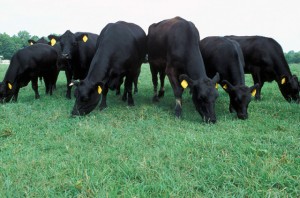The Sustainable City Network posted an intriguing article today on the potential for increasing cattle production reducing the emission of greenhouse gases, based on new research from Iowa State researchers. The potential to reduce carbon emissions comes from switching land from production of row crops like corn to pastures, which would reduce erosion and loss of carbon through soil loss as well as reduction in fertilizer usage. The pastures would also increase the soil’s ability to store carbon by improving soil health.
One question that you might have is how this would impact the production of methane through animal digestion. They quote Mark Rasmussen, director of the Leopold Center for Sustainable Agriculture at Iowa State University and co-author of the study, who says “Cattle produce the greenhouse gas methane through their ruminant digestive process. But those emissions make up a smaller percentage of anthropogenic, or man-made, emissions than row-crop production. The study found that ruminants generate 11.6 percent of total anthropogenic emissions, while cropping and soil-associated emissions contribute 13.7 percent.”
Obviously, the cattle would have to be grass-fed, since feeding them grain would just increase the need for row crops, and that would involve significant changes in production due to longer time reach full size and would probably require changes in genetics to the livestock to take full advantage of pasture feeding.
